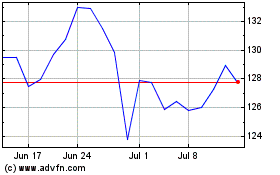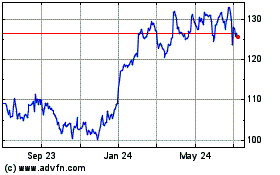Merck Stops Clinical Trial of Alzheimer's Drug
February 14 2017 - 7:06PM
Dow Jones News
By Peter Loftus
Merck & Co. said Tuesday it stopped a clinical trial of an
experimental Alzheimer's drug because it wasn't helping patients,
the latest setback in the pharmaceutical industry's quest to find a
better treatment for the brain disorder.
An outside committee monitoring the study of more than 2,000
patients with mild to moderate Alzheimer's concluded there was
"virtually no chance of finding a positive clinical effect" of the
drug, verubecestat, Merck said. The study, which was due to be
completed around midyear, was testing whether verubecestat slowed
declines in patients' cognition and daily functioning compared with
a placebo.
"The benefit-risk profile no longer made any sense," Roger
Perlmutter, president of Merck's research unit, said in an
interview. He said there weren't major safety issues that on their
own would justify stopping the study, but "it did not make sense to
expose patients to any risk, whatever that may be, because the
study would not succeed."
Current treatments for Alzheimer's can alleviate symptoms but
don't slow the condition's underlying progression. The
dementia-causing brain disorder afflicts an estimated five million
Americans and tens of millions globally, but has been a tough
disease for the drug industry to crack because scientists don't
fully understand what causes it.
Companies have searched for drugs that slow the disease's
underlying progression, but with no success so far. Last year, an
experimental Eli Lilly drug for Alzheimer's, solanezumab, failed in
a clinical trial.
Merck's drug was closely watched because it was at the most
advanced stage of testing for a class of drugs known as BACE
inhibitors. They are designed to prevent an enzyme from producing a
sticky protein in the brain known as beta amyloid -- believed by
many to be the primary culprit in Alzheimer's. BACE inhibitors work
differently than the amyloid-targeting antibodies that have failed
in clinical trials, including Lilly's solanezumab.
AstraZeneca PLC and Lilly are among other companies developing
BACE inhibitors.
Merck said it would continue a separate study of verubecestat in
patients at an earlier stage of Alzheimer's known as prodromal.
Results from that study are expected in 2019. The outside
monitoring committee recommended this study continue unchanged,
Merck said.
Dr. Perlmutter said it is possible that treating patients with
mild to moderate Alzheimer's is too late in the disease for Merck's
drug to make a difference, and that treatment at earlier stages
could provide a benefit.
Merck plans to release more detailed results from the failed
study at a coming scientific meeting.
Write to Peter Loftus at peter.loftus@wsj.com
(END) Dow Jones Newswires
February 14, 2017 18:51 ET (23:51 GMT)
Copyright (c) 2017 Dow Jones & Company, Inc.
Merck (NYSE:MRK)
Historical Stock Chart
From Mar 2024 to Apr 2024

Merck (NYSE:MRK)
Historical Stock Chart
From Apr 2023 to Apr 2024
